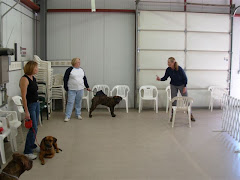
Jim is 83 and legally blind. He lives in a senior citizen apartment complex with his Dachshund, Oscar. Jim has done the best he can to teach Oscar good manners, including taking him to class and earning a Canine Good Citizen tag for Oscar. But Oscar has a barking problem that Jim is personally unable to modify , so I suggested surgical de-barking as a remedy.
I think it's the first time in my career that I've ever advised someone to have this done. Normally I tell them to go through the other training steps first, and to address the issue of why the dog barks so much.
But Jim's case is different. Oscar barks when Jim leaves the apartment to go get the mail. He barks and disturbs the neighbors when they're gardening outside. When he's out on a leash with Jim, he barks at strangers who want to pet him. He barks quite aggressively when anyone comes to Jim's door.
Oscar's behavior isn't abnormal, nor is it "wrong." It's just inappropriate. Jim simply isn't able to effectively correct Oscar when he barks. Jim has physical limitations that preclude him from doing so, and his timing of corrections isn't as good as it may have once been. Oscar thinks it's his job to protect Jim. And that's not about to change.
Jim doesn't need a watchdog, so it's not necessary for Oscar to ever bark. So there were one of two ways Jim could effectively address Oscar's barking. One was a "no-bark collar." The other was surgical de-barking.
He asked me which I would recommend. I had to think about it, but finally chose de-barking. In the past I've used various "no-bark collars" (electronic shock and citronella spray, the latter being useless), and the shock collars work well for some dogs. But I know Oscar, and that type of corrective collar would have been devastating to this emotionally hypersensitive dog. Plus, "no-bark collars" for small dogs are difficult to find. They're also expensive, and sometimes they don't work reliably.
So I recommended the surgical de-barking. It's a simple, virtually bloodless surgery that is quick and low risk. With the dog under general anesthesia, the veterinarian will sever the vocal cords.
After the surgery, Oscar will still "bark," but it will be more like a whisper bark. It will be a lot easier to live with. Oscar himself won't notice any difference at all. He'll still be making a noise, and he'll be just as reactive as he is now. It won't change his personality.
There's a possibility the vocal cords will repair themselves and Oscar's normal bark will come back. But that bridge can be crossed later. It's right now that matters. Jim's neighbors have complained. Oscar may have to go if Jim can't get the situation resolved. And Jim desperately needs Oscar.
Not all vets will perform the sugery. Some feel it's ethically wrong. I feel it's wrong, too, if a lazy dog owner would rather remove his dog's bark than address the dog's needs through training, behavior modification and love. But there certainly are exceptions to all cases. Jim and Oscar are a good example.


















No comments:
Post a Comment